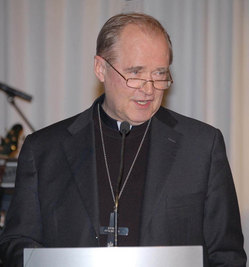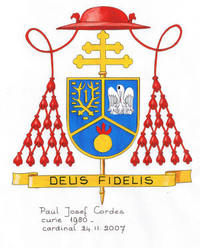Today I had the opportunity to hear Paul Josef Cardinal Cordes deliver an address at
 Seton Hall University, "To Defeat Evil--Possible?" at a ceremony which bestowed an honorary doctorate of humane letters on him. The 71 year old prelate hails from the Archdiocese of Paderborn, Germany, though he has worked at the Vatican since 1980. Pope Benedict made him a cardinal in November 2007.
Seton Hall University, "To Defeat Evil--Possible?" at a ceremony which bestowed an honorary doctorate of humane letters on him. The 71 year old prelate hails from the Archdiocese of Paderborn, Germany, though he has worked at the Vatican since 1980. Pope Benedict made him a cardinal in November 2007.Cardinal Cordes is the president of the Pontifical Council Cor Unum (One Heart) for Human and Christian Development established by Pope Paul VI in 1971. The work of Cor Unum, virtually unknown to many Americans, demonstrates in concrete ways "the care of the Catholic Church for the needy, thereby encouraging human fellowship and making manifest the charity of Christ."
The Cardinal said that sentimentality is unhelpful when it comes to religious and concrete reality; sentimentality allows us to slumber and therefore overlook evil. Look at the well known events of human history to see the effects of the human capacity for evil. The one bomb that still needs to be defused is that of the all-consuming anger in the heart of men and women. Today we continue to demand an answer that promotes real peace. The UN and other socio-political organizations can't do the heavy lifting in eradicating evil: we need a concrete proposal that unveils the many sources of injustice, the psychological problems faced by man and woman and false religion. To zero-in on the serious issues of life that are born of the heart. What often happens and is rather unsatisfactory is dealing with life from the angle of empirical data alone. The Christian needs to step up to the plate approach these questions, particularly evil, from the approach of divine revelation.
 His Eminence noted that the root of evil as identified by Paul of Tarsus, is godlessness. The definition of godlessness is an interior denial of God, whose message of love is revealed in the Word made flesh which creates in man a sense of depravity, isolation and anger. Man's wrong doing, indeed all sin as noted by Saint Paul, is grounded in the refusal (perhaps man's inability?) to acknowledge God as sovereign and the hatred man can have for self (see Romans). Through this lens it is possible to see the results of godlessness in acts of wrong doing, sometimes terrible evil. Early in our ecclesial history people like Saint Irenaeus (+202) spoke of the soul's battle between good and evil as resulting in a lack of obedience to God, a lack of authentic belief, that is, believing the promises of Jesus are true and that God wants a relationship with humanity, and the inability of man to follow the divine commandments. Essentially, not following God is the real problem.
His Eminence noted that the root of evil as identified by Paul of Tarsus, is godlessness. The definition of godlessness is an interior denial of God, whose message of love is revealed in the Word made flesh which creates in man a sense of depravity, isolation and anger. Man's wrong doing, indeed all sin as noted by Saint Paul, is grounded in the refusal (perhaps man's inability?) to acknowledge God as sovereign and the hatred man can have for self (see Romans). Through this lens it is possible to see the results of godlessness in acts of wrong doing, sometimes terrible evil. Early in our ecclesial history people like Saint Irenaeus (+202) spoke of the soul's battle between good and evil as resulting in a lack of obedience to God, a lack of authentic belief, that is, believing the promises of Jesus are true and that God wants a relationship with humanity, and the inability of man to follow the divine commandments. Essentially, not following God is the real problem.The question remains of our being a prisoner to sin. Well, the way to overcome sin is the experience of being in community. In Paul's view of true and authentic community comes from living within the life of community of faith. Thus, being sensitive to movements of the heart, including the wound of sin, man thrives and lives "wholistically" in the context of a living faith.
Cordes examined the overall work of Sigmund Freud whose work in psychology is notable in that he tried to identify the impulses for human wrong-doing, guilt/shame, neurosis and psychosis. But Freud's work is significantly flawed because he refused to deal with the role of the transcendent and religion in the lives of man and woman. Freedom in Freud is reduced and man's capacity to transcend self is non-existent. The problem as Cordes sees it, is that Freud had ample evidence of man transcending self in loving God and neighbor and he neglected these matters in his research. Having said this, one can appreciative of many advances known in the science of psychology without baptizing the entire academy. As Cardinal Cordes acknowledged, the Church does not have to fear psychology and psychology doesn't have to be insensitive to faith, reason and human behavior. (We need to rehabilitate the relationship between the two.)
Evil, from the theological point of view, is conquered by the triune God. For example, in Jesus death is trampled down by death itself. Therefore, we say the ultimate key to overcoming evil is acknowledging God's capacity to fill man's heart with love so as to inch out evil. Hence the evil we face is a crisis not about a mere ability to do evil as much as it is about a crisis about God. Does God reign or not? Does God exist or not? Does the community of faith have a true knowledge and experience of God or not? Nietzsche once said he'd be a Christian if he could find a credible witness to the gospel.
One of religion's problems today is that it often has deeply religious people who can't balance the practice of religion with reason. Praying people need to think. Religion is no good if it relies on emotions (cf. Benedict XVI, Deus caritas est). Reasonable people know that faith and reason needs to have equilibrium because the isolation of faith from reason leads to events like September 11th.
The decisive part of man's being is his capacity for using the inner sensitivity of doing the will of God which leads to man's happiness. Conversion touches my heart when I say 'yes' even when I might be influenced to do the opposite. My personal responsibility for my actions is critical in the exercise of genuine faith: my complete self needs to be fully engaged. That we are baptized into a community is not an excuse not to say 'yes' and to engage my total person in matters of faith.
 The Cardinal was asked what leads others to real faith. His answer was simple: happy Christians attract others. The reliability of the witness and authenticity addresses the questions of the "seekers" and atheists. Authenticity is likely the most important factor in attracting or repelling people to Christ. Witnesses and their authenticity combats the wrong information disseminated in the media because the credibility of the witness gives a taste of the faith looking to speak about man's happiness and human need. The discovery of Christ doesn't happen in the media because of its impersonal milieu--it happens personally; battle is done person-to-person.
The Cardinal was asked what leads others to real faith. His answer was simple: happy Christians attract others. The reliability of the witness and authenticity addresses the questions of the "seekers" and atheists. Authenticity is likely the most important factor in attracting or repelling people to Christ. Witnesses and their authenticity combats the wrong information disseminated in the media because the credibility of the witness gives a taste of the faith looking to speak about man's happiness and human need. The discovery of Christ doesn't happen in the media because of its impersonal milieu--it happens personally; battle is done person-to-person.I am happy to say that the Cardinal noted the work of Communion and Liberation and the Neocatechumenal Way as vital for health of the Catholic faith. The emphasis each of these groups place on the personal encounter with Christ and person-to-person approach is striking.


Leave a comment